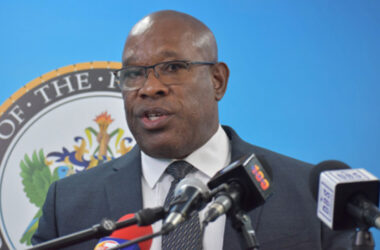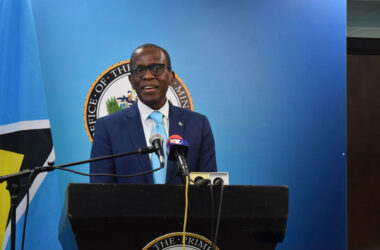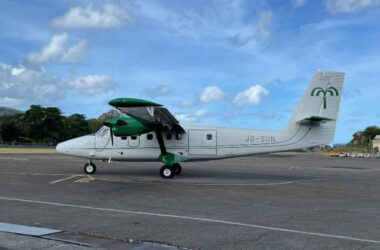
Cognizant of the impending financial woes facing the citizenry, Prime Minister Phillip Pierre presented a record $1.84 billion budget to parliament last week as the country grapples to recover from the economic depression and social malaise brought on by the coronavirus (COVID-19) pandemic.
Pierre disclosed that the budget will provide salary increases for public servants and improve the various social safety nets in the aftermath of the Covid-19 pandemic.
He outlined the magnitude of works to be undertaken by his administration’s first national budget, the Estimates of Revenue and Expenditure for the fiscal year 2022-2023.
“The COVID-19 pandemic’s persistence and the Russia/Ukraine war present considerable downside risks, which warrant innovative and transformative policy interventions,” declared PM Pierre, as he pushed for socio-economic policies to stem the tide as the country recoils from this global crisis.
He explained that the Estimates aim to fulfill the following obligations: Provide the platform for sustained growth; Support the continued robust performance of the tourism industry; Expand construction in the public and private sector; Encourage prudent, responsible, and transparent fiscal management; Implement tools that will assist in significantly reducing waste and unnecessary spending; Develop institutional frameworks designed to eliminate corruption and create an environment where there is a substantial reduction in revenue from fuel.
The finance minister also noted that “Budget implementation performance for the 11-month period based on the latest available data, has generally been satisfactory, notwithstanding the fact that we continue to face several challenges, including the current COVID-19 pandemic, the recent international developments in Eastern Europe, and the internal administrative constraints that we intend to address.”
The prime minister assured that “notwithstanding the fundraising challenges, my government anticipates that by the end of March 2022 total resources that would have been used to finance the budget would have amounted to $1.584 billion; comprising $1.031 billion in domestic revenues, $54.98 million in external grants, $326.6 million in loan disbursements and $171.4 million in treasury bills, notes, and bonds.”
On the issue of expenditures, he stated that EC$1.359 billion of this amount is proposed to be used for Recurrent Expenditure.
Pierre further explained that “with just a few days to go before the end of the fiscal year, preliminary data suggest an expenditure outturn of $1.584 billion; indicating underspending by some $54.29 million or 3.3 per cent below the approved estimates for the fiscal year 2021-2022.
He stated that the projected level of total revenue and grants is forecast to rise by EC$248.1million, or 23 percent above the preliminary outturn for the fiscal year 2021-2022.
Pierre said that the Recurrent revenue inflows are expected to increase by EC148.6 million relative to the approved estimations for 2021-2022, to reach a total of EC$1.150 Billion for the fiscal year.
He stated that the increase was due to slow but sustained recovery during 2021-2022. The new fiscal year will see continued recovery in the construction, tourism, and agricultural sectors.
Pierre said the total projected recurrent revenues included tax revenue of EC$1.016billion and non-tax revenue of EC$133.9m.
The outturn for 2021-2022 is 9.5%. Non-tax revenue is expected to increase by 34.2 percentage points compared with the Revised Estimate of the previous year.
Pierre stated that the growth in tax revenue is influenced in part by the continued recovery in economic activity due to the COVID-19 pandemic.
“The significant increase in non-tax revenue is projected as a result of the higher anticipated Citizenship by Investment (CBI) inflows expected to be deposited in the St. Lucia National Economic Fund pursuant to the St. Lucia National Economic Fund Act,” Pierre said, adding that he hopes the CBI programme does not suffer from any adverse international events, an apparent reference to moves by the European Union and the United States to have the programme terminated in the Caribbean.
Pierre stated that taxes on incomes and profits will be EC$256.1million, an increase of EC$20.7million due to expected increases in all components of this revenue category, namely income tax form corporations, income tax forms individuals, withholding tax and arrears.
He stated that the revenue from corporation taxes is expected to be EC$73.1million reflecting an upward trend in corporate profitability rebounds. This is due to the higher economic activity expected to result from relaxing or adjusting restrictions on social events, ending curfews and discontinuing confinement, which were implemented to manage and control COVID-19’s in-country spread.
He also stated that the government expects an increase in revenue from individual Income Tax, estimated at EC$114.8 Million, as the number of people expected to return full-time to work is expected to rise, particularly in the construction and tourism industries.
PM Pierre also projects an increase in income taxes arrears. He estimates it at EC$49.8million, an increase of $10.9million or 28.27 percent from the outturn in 2021-2022.
“The projected increase in corporate profitability, along with the increase over the medium term in the employment rate and collection of arrears in Withholding tax will positively influence the revenue outcome for this line,” he said.
Pierre stated that taxes on international trade will rise by 13.15 percent to reach EC$236.4 million, while taxes on domestic goods are expected to generate EC$515.7 million, which is 8.43 percent above the revised figure for 2021-2022.
He stated that the projection for non-taxes revenue is EC$133.9million, which is a 34.18 percent increase over the 2021-2022 outturn.
“The main contributor to the increase in inflows during the current fiscal year is expected to be the contribution by the National Economic Fund, in-transit fees, and sale of goods and services,” the prime minister said.
Pierre stated that the budget targets a deficit of EC$394.million and, when you add the principal repayment for the current year, a financing gap of EC$505.1 million. This will be financed using a mix of domestic and foreign financing resources.
He stated that, in addition to total revenue of EC$1.327million, it is likely that the government will have EC$505.12million consisting of $425.4 million. This is equivalent to 84.2 percent of the total financing requirements for the year.
“Domestic financing is expected to be moderate given that much lower amounts are programmed from primary bonds. This is entirely in keeping with my government’s strategy of relying on external borrowing on concessional terms rather than the market debt which bears higher interest rates,” he said.
Pierre stated that the domestic funding requirement is EC$79.7million and will be sourced via various sources, including Treasury Bills or Treasury Notes.
He also stated that employee compensation accounts for approximately 33.25 percent of the annual total budget.
The prime minister said in this year’s fiscal package, a total provision of EC$590.7 million has been set aside for wages and salaries including EC$30.13 million to cover compensation and other benefits.
Additionally, a sum totaling EC$108.55 million has been allocated for retirement benefits. $14.15 million of this amount is for employer contributions towards NIC.
“Overall, employee compensation is programmed to increase by 11.88 per cent relative to the outturn for the current financial year. The allocated amount also makes provisions for in-year promotions and other salary and wage allowances,” Pierre said.
He stated that the increase in public servants salaries will be effective as of April, with the payment to the first tranche of arrears owed to them in December. The second tranche will be paid in March 2023.
Pierre stated that the debt service payments amount to EC$285.03million for the fiscal year. This is a decrease of 5.3 percent relative to the approved estimates 2021-2022.
He stated that a total amount of EC$150.7 million was set aside to service domestic loans, while EC$133.83 million has been earmarked for foreign debt servicing.
“As the allocation programmes in this budget indicate we intend to tackle the challenges with boldness and confidence. We remain optimistic, assured, and rooted in our resolve to maintain economic stability and chart a path to sustainable growth,” Pierre told legislators.
He said the budget is designed to “bring the economy into a state of recovery’ adding this year “we are trying to increase employment.”
“However, what is important is that the spending in the budget is spending that is for projects that are going to increase the level of employment in the country, create wealth and most of all, there are expenses to improve the social safety nets so the underprivileged and people who suffered under COVID, they are going to get relief from this budget,” the prime minister said.
Of the total allocation of $561.06 million for development projects and initiatives, $170.20 million or 30 percent is proposed for the Department of Infrastructure, Ports, and Transport. This amount will cater to the payment of new and outstanding Design-Finance-Construct arrangements (DFCs).
These projects will include, Reconstruction of bridges such as the Cul-de-Sac Bridge; the Rehabilitation of Roads such as the Millennium Highway Project, and other ongoing road maintenance and rehabilitation projects.
He said the Department of Economic Development and Youth Economy has been allocated the sum of $126.84 million, accounting for 22.6 percent of the development budget.
The prime minister noted that the allocation for projects under the department represents a 224.7 percent increase over the approved budget allocations for 2021-2022.
The development programme for the department is to primarily undertake four major projects, namely: Disaster Vulnerability Reduction Project ($43.7 million); Constituency Development Project ($28.9 million); St. Jude Hospital Reconstruction project ($28.1 million); and The implementation of the Youth Economy ($10 million).
With optimism that the government can effect substantive changes on the socio-economic landscape, Pierre said that his administration will pursue the initiatives and programmes funded in this budget “to bring transformative change that would impact lives and livelihoods for our people and put the people first”.














